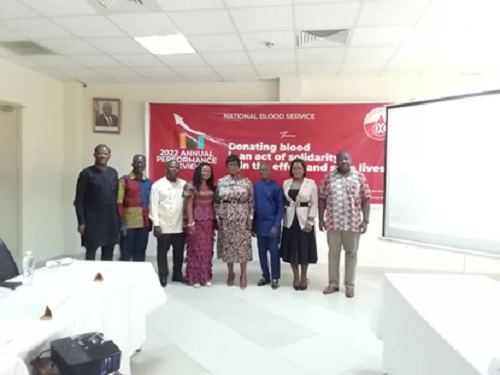Members of NBS Governing Board with the Deputy Minister for Health
Voluntary unpaid blood donations dipped in 2022 recording 24 per cent of the 33 per cent target of the National Blood Service (NBS).
According the 2022 annual performance report the percentage was less than that of 2021 which was 26 per cent of the targeted 33 per cent.
CEO of NBS, Shirley Owusu-Ofori, speaking at the performance review in Accra said the Blood Collection Index (BCI) per 1000 in the population stood at 5.7 in 2021 but decreased to 5.5 the following year.
“Volunteer mobile sessions stood at 646 in 2021 as compared to the 897 figure of 2022 however, it did not meet the set target of 1,063 for the year,” she said.
“The percentage of samples tested for Transfusion Transmissible Infections (TTI) stood at 100 per cent, meeting its target whiles the percentage of blood donations separated into components stood at 26 per cent surpassing its 2022 target of 24 per cent,” she stated.
She further highlighted that the use of technology in aiding blood donations was positive as 4,103 units of blood products were supplied via drones to user facilities across the country whiles the total number of 6,284 units of blood were collected using Fly Zip Drone service from 79 blood drives.
“In the end, the total amount of funds received from the government to aid the service in their activities was GHC 12,611,670.09 which left a difference of GHC 3,293,931.94 from the budget suggested by the service which was GHC 15,905,602.03,” she shared.
She also noted that aside funding, the service struggled with the inadequate number of voluntary unpaid blood donors with over-reliance on family replacement donors. Inadequate vehicles and essential equipment also posed a challenge to the service.
Shirley Owusu-Ofori therefore called on the citizenry to regularly donate blood which would help tackle some of the challenges of the service.
“NBS is an essential health care provider and a critical one as such. Therefore, when there is no blood, health care at all levels is put at risk and grinds to a halt, hence the need to promote regular voluntary blood donation to ensure adequately stocked blood banks all year round,” she stated.
Deputy Minister for health, Tina Mensah encouraged NBS to come up with recommendations to help improve their systems.
“Seasonal shortages of blood are a huge problem for us in the health sector, but it is particularly acute in resource-constrained settings like the Blood service. I therefore charge the new governing board, the CEO, Management, and staff to make intensive efforts and discover innovative ways of reaching out to the public for advocacy,” she pointed out.
By Abigail Atinuke Seyram Adeyemi & Nafisatu Abdul Razak


